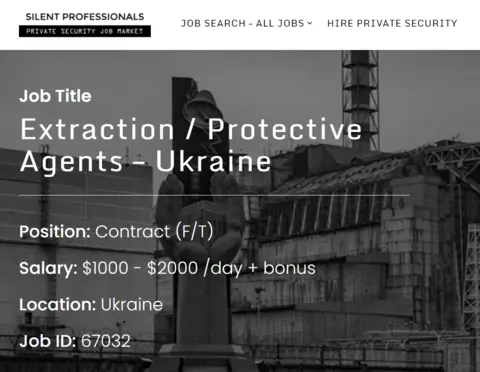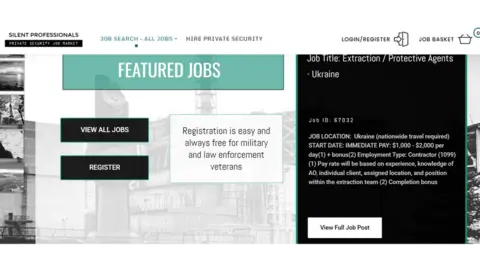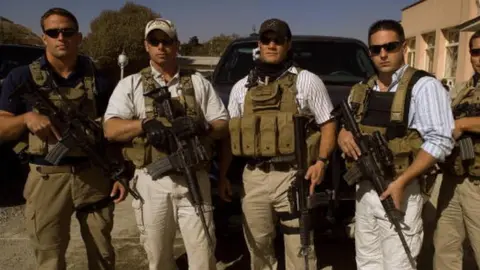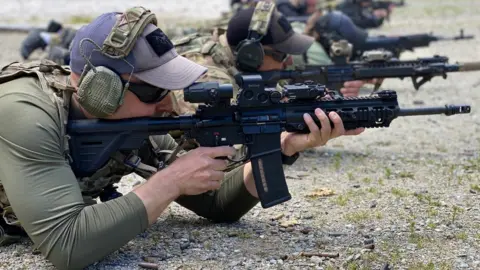Private military firms see demand in Ukraine war
 BBC
BBC
Wanted: multilingual former soldiers willing to covertly head into Ukraine for the handsome sum of up to $2,000 (£1,523) per day - plus bonus - to help rescue families from an increasingly grim conflict.
It sounds ripped from the script of an action movie, but the job advert is real - taken from an employment website, Silent Professionals, for those working in the private military and security industry.
And, insiders say, demand is growing. Amid a gut-wrenching war in Ukraine, US and European private contractors say they are increasingly eying opportunities, ranging from 'extraction' missions to helping with logistics.
There is "a frenzy in the market" for private contractors in Ukraine today, said Robert Young Pelton, a Canadian American author and expert on private military companies (PMCs).
But the demand for paid security workers - many of them former soldiers with ability to fight and kill - in the midst of a war leaves plenty of room for mistakes, and the potential for bedlam.


Even as Westerns volunteers are joining the fight in Ukraine, for which they can expect to be paid the same as their Ukrainian counterparts, money is being offered by private interests for security services like the one advertised on Silent Professionals.
The recruitment platform would not say who it was advertising for, but according to Mr Pelton, contractors are being hired for between $30,000 and $6m to help remove people from Ukraine. The higher-end figure is for whole groups of families wanting to leave with their assets, he said.
The price of evacuations depends on the complexity of the work, said Tony Schiena, CEO of Mosaic, a US-headquartered intelligence and security advisory firm already operating in Ukraine.
"When there's a larger amount of people, the risk goes up. Children and families are more difficult. It all depends on the methods we get them across".
Mosaic's missions are largely intelligence-driven, rather than armed, said Mr Schiena, a former South African intelligence operative whose firm includes several former high-ranking US intelligence officials on its board.
They are working with private clients, corporations and PIPs - politically exposed people - to help evacuate them from Ukraine, Mr Schiena told the BBC.
He claimed an "intelligence agency of a pretty large country" that wanted to get its citizens out was among his clients.
"Depending on how the conflict plays out, I think there will be a constant demand for [PMCs]," Mr Schiena said. "There's a constant need, and as [the war] escalates or de-escalates, there's always going to be something that we're approached to do".
 Getty Images
Getty Images
Private military and security firms have existed for decades, but were thrust into the public eye during the wars in Iraq and Afghanistan after 9/11, working on behalf of Western governments and commercial interests.
At the height of the Iraq war, tens of thousands of private contractors, such as Blackwater, were operating there. Tasks ranged from armed missions such as convoy protection to feeding and housing troops at military bases. Blackwater became notorious after a number of high-profile incidents, including the death of 14 Iraqi civilians shot dead by its contractors in Baghdad in 2007.
In Eastern Europe, private firms have long been used to protect wealthy people and corporations.
During the break-up of the former Yugoslavia, a number of firms were also hired to help equip, train and organise Bosnian and Croatian forces - all with the blessing of the US government.
The nature of the industry means that tracking the number of contractors and money is difficult, but it is by all accounts a growing industry. A report from Aerospace & Defense News found that the global private military and security industry will be worth over $457bn (£348bn) in 2030, up from about $224bn in 2020.
Contractors or mercenaries?
Foreign military contractors say they are not fighting in Ukraine.
Some say they are being approached to help NGOs and humanitarian organisations in Ukraine or neighbouring countries in need of people with specialised skills and experience working in austere conditions in conflict zones.
"Most of the guys I personally know going over are doctors, physician assistants, paramedics, nurses and former special ops guys - or non-special ops guys - who are combat vets and understand," said Mykel Hawke, a former US special forces officer who has worked as a war zone contractor.
Western contractors are governed by the laws and regulations of their own countries, said Christopher Mayer, a former US Army Colonel who worked with PMCs in Iraq.
They are supposed to protect people, places or assets, rather than engage in direct combat.
Many in the industry bristle at the suggestion that they are 'mercenaries' or soldiers of fortune.
"It's the same kind of work that you see in the United States and elsewhere," Mr Mayer said. "The difference is that in areas of conflict, the likelihood of having to use lethal force is much, much higher".
In practice, though, the line is blurry.
"If you have the skillset to be a private contractor, you have the skillset to be a mercenary. There's no bright line between the two," said Sean McFate, an-ex US paratrooper who later served as a contractor in Africa and elsewhere. "It comes down to market circumstances and the decision of the individual person."
"People talk about legitimacy and who the client is. None of that matters," he added. "If you can do one, you can do the other".
The proliferation of PMCs may lead to as much "chaos and mayhem" as good, he warned.
"Mercenaries historically elongate conflict for profit," he added. "It could get to a point in the mid-century where super-rich people have private armies, and I don't know how that looks."
 Submitted photo
Submitted photo
Examples of such companies taking an offensive approach to conflict include the South Africa-based Executive Outcomes, which fought on behalf of the government of Angola and Sierra Leone in the 1990s.
Sandline International, headquartered in London, was involved in conflicts in Papua New Guinea, Liberia and Sierra Leone.
And members of Russian mercenary groups are said to be on the ground in Ukraine.
But Simon Mann, the former British special forces officer founder for Executive Outcomes and Sandline, told the BBC that the prospect of using Western contractors for offensive missions in Ukraine is "highly unlikely" and would pose complicated legal and organisational questions.
"How [would they be] funded? How [would they be] commanded? Where would they fit in the Ukraine order of battle?" he asked. "Would they be duly enrolled in the national armed forces before any operations? If not, then what would be their legal position? Casualties? Medical cover? Death and disability insurance?"
Mr Mann - who spent several years in prison after being accused of leading an aborted coup d'état in Equatorial Guinea in 2004 - said that he is aware, however, of evacuation missions charging £10,000 per person, "mostly organised by PMC-type people who happen to have contacts on the ground".
Some have warned that even paid-for rescue missions into Ukraine could be fraught with danger for contractors and clients alike, and that the industry is awash with people misrepresenting their ability or experience.
Orlando Wilson, a former British soldier and long-time security contractor, said that he believes that most of the talk surrounding private contractors in Ukraine is "rubbish".
"I don't see how people can operate in Ukraine at the moment, at least not privately," he said.
"If you're caught by either side or one of the militias, they'll just take you as a spy and that's it," Mr Wilson added. "It wouldn't be safe for people doing it and it wouldn't be safe for the clients".
